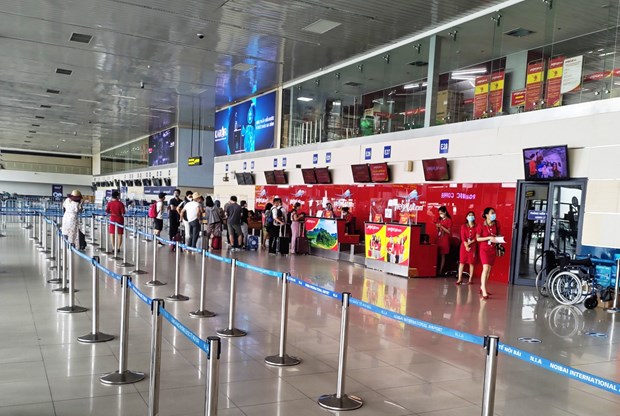[ad_1]

HÀ NỘI — Bus companies, railway and airline firms have been struggling to survive amid the impacts of COVID-19 for a year and a half.
Although they have reduced their workforces and slashed operating costs, firms still face bankruptcy.
Khúc Hữu Thanh Hải, director of Đất Cảng Transport, Trading and Service Joint Stock Company, said his company had temporarily suspended about 80 per cent of their vehicles from operation.
Among the vehicles still in operation, the highest number of passengers per vehicle only reached about 20 per cent compared to the past, he said.
“We still do not know when we will fully recover,” he said.
The situation would be much worse if the pandemic’s developments stayed complex like now, he said.
“We can’t think of another way to survive except for minimising costs,” he added.
Đỗ Văn Bằng, director of Minh Thành Phát Company Limited said since early May, most of the company’s coaches were suspended from running due to a lack of passengers.
The company had 100 coaches, however, only 2-3 coaches were in use, he said.
Currently, the company only earned VNĐ2 million (US$86) per trip from Hà Nội to Lào Cai while the operating cost for a trip was up to VNĐ7.5 million ($324), he said.
Thus, the revenue failed to cover operating costs, he said.
“The number of passengers is very small, many drivers and employees have quit their jobs,” he said.
Many bus stations have fallen into the same situation because of the absence of vehicles entering the station.
Lý Trường Sơn, director of Mỹ Đình Bus Station, said an estimated 800 buses departed daily before the pandemic.
But now the number was only 350 and the number of passengers was very small, he added.
“If the COVID-19 pandemic still shows complex developments, both transport companies and bus stations will go bankrupt,” he said.
The railway and air transport sectors have the same problems.
Nguyễn Viết Hiệp, general director of Hà Nội Railway Transport Joint Stock Company, said due to the impacts of the pandemic, in the first quarter of 2021, an average of 550 labourers had their contracts suspended each month and the company also terminated the contracts of 66 others each month.
Statistics of the Civil Aviation Authority of Việt Nam show that on April 29, Vietjet Air operated 366 flights, transporting more than 60,000 passengers, by May 15, there were only 61 flights and 8,000 passengers. On April 29, Vietnam Airlines operated more than 420 flights and transported more than 70,000 passengers, by May 15, the numbers were only 45 flights and 6,000 passengers.
Other airlines are in the same situation.
Solutions
In response to the situation, the Ministry of Transport has submitted some policies to Prime Minister Phạm Minh Chính to help the transport sector survive during the pandemic.
The ministry proposed extending the policy of reducing 50 per cent of fees for aircraft take-off and landing services for domestic flights as well as extending policies providing favourable credit deals, bank interest rates and payment terms for businesses.
For transport enterprises, the ministry proposed extending the validity of Circular No. 112/2020 on the collection of some fees and charges until the end of 2021 to extend the time of reducing 30 per cent of road maintenance fees for coaches and 10 per cent for trucks until the end of this year.
The ministry also asked to reduce the value-added tax to zero, reduce 50 per cent of corporate income tax for companies seriously affected by the pandemic, delay payment for six months for the tax amounts that companies had to pay until the end of 2021 and charge no fees for parking and picking up passengers at airports, train stations and ports.
The State Bank of Việt Nam and commercial banks were asked to continue implementing policies to support transport companies by reducing or not charging interest on loans and offering debt rescheduling, the ministry said. — VNS
[ad_2]
Source link
